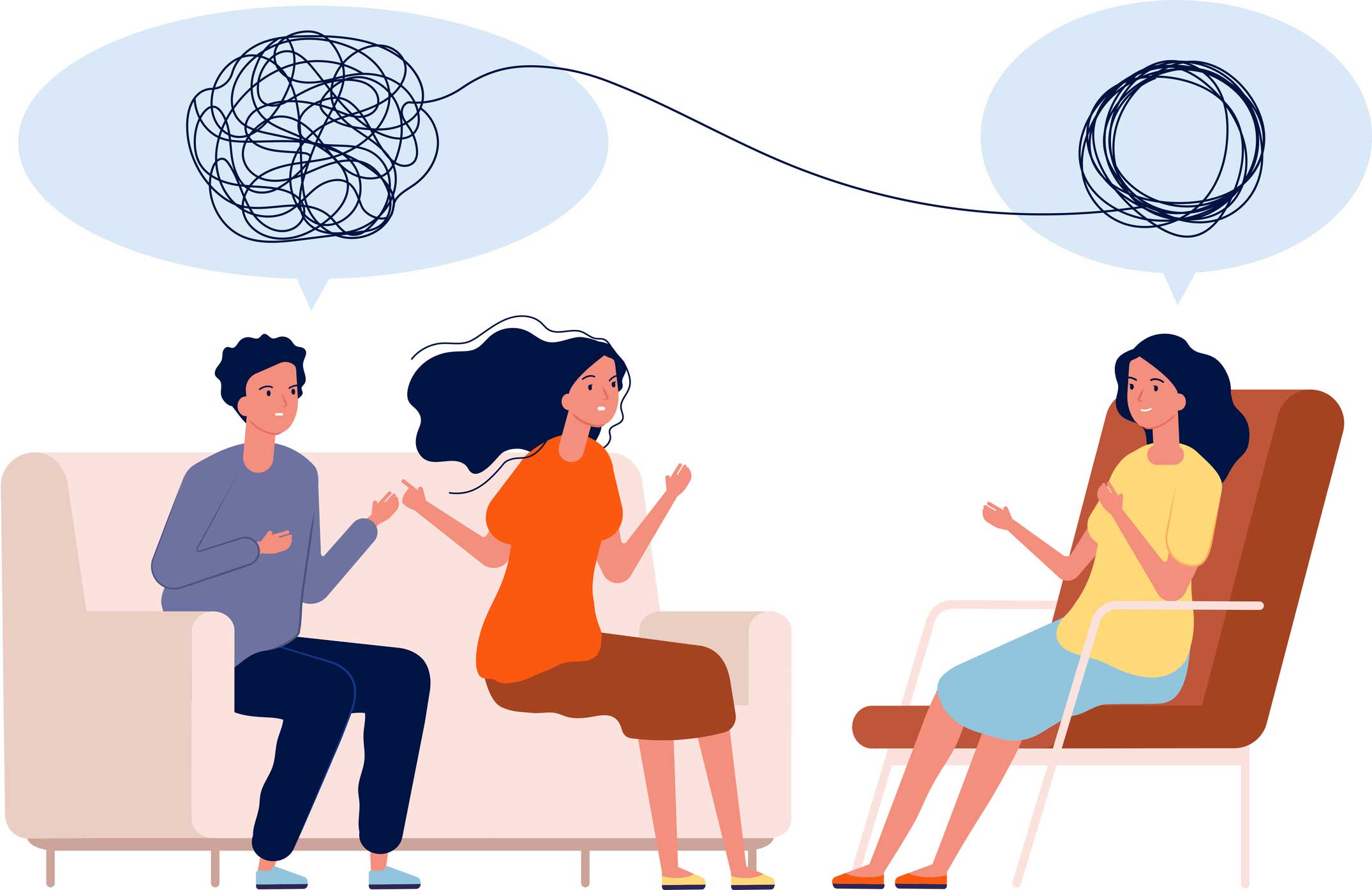It’s pretty common to start couples therapy strong. You use your empathy skills and make a good connection with each partner. Each one has a chance to describe the problem and each feels understood. And with basic skills, you begin to shift troubled interactions to more collaboration and better communication.
Then it happens. Progress stalls. Sessions start feeling repetitive. Your insights and feedback have limited value.
Now what?
Consider this. Most likely, one or both partners has hit an intrapsychic impasse and they are showing you the impasse that is preventing relationship growth.
Here’s an example. In a previous session a client, Charlie made a commitment to call his wife, Sue, when he was going to be late for dinner. He did not call and now Sue reports that they are once again fighting about the same issues that brought them in. She is feeling distressingly hopeless that this pattern will change. It’s another dreary example of how Charlie promises and doesn’t deliver. She says it makes total sense not to trust Charlie again.
Charlie says this is a one time error. He fully intended to call but an unexpected circumstance occurred when his boss called an emergency meeting. He asks, “Why can’t Sue cut me some slack?”
What do you do?
Do you give Charlie a “pass” on this one and help him express renewed commitment to do better?
Do you help Sue reduce her distress, enlarge her perspective and find a better way to express her hopeless disappointment, so Charlie will be compassionate?
Luckily, you were anticipating this. You knew they might stall and you know how to work with this impasse.
You know that everyone has a limbic system that may generate resistance to achieving desired goals. So you are not surprised by Charlie’s lack of follow-through.
You are also not seduced by his apparent “legitimate” excuse.
You take this opportunity to deepen the work. You go quickly from their systemic fight to intrapsychic work.
Here’s what I mean.
You help Charlie describe the conflict between his two brains. You ask him to describe each side in the present as if he is experiencing it right now. One side of his brain wants to collaborate, be dependable, and strengthen his connection with Sue. This would be his visionary brain or prefrontal cortex.
The other side of his brain, AKA “the lizard brain,” is impulsive and makes excuses rather than being accountable, especially when it is inconvenient. He wants to do what he wants to do when he wants to do it!
Here is how you direct this intrapsychic dialogue.
You could start like this. “Charlie, when you made the commitment to call Sue, what were you thinking and feeling? Let’s review all the benefits to you, to Sue, and to your relationship if you stick to your commitments even when it is difficult.”
You recap and embellish whatever Charlie describes.
Then say, “Good. Now let’s move over here to another chair and respond from your alter ego that says something like, ‘Well those reasons sound pretty good, however….’ And let’s hear from the part where it is often difficult to maintain commitments.”
You can smoothly validate, embellish and even clarify the reasons it is hard to keep commitments. When done well, Charlie will feel supported in his resistance without getting defensive.
You can go very deep into Charlie’s ambivalence about change. And you do this by challenging Charlie to dialogue with himself. As Charlie verbalizes more and more of his resistance, he will be increasingly open about what keeps him stuck.
Having this dialogue in front of Sue gives her a clearer picture of Charlie’s intrapsychic conflict and is the first step to deepening your work and their conversation.
By understanding the neuroscience of the limbic brain opposing the collaborative visionary brain, you’ll recognize the myriad ways that intrapsychic conflict shows up. Now, your work is faster and more comprehensive with less effort.
Sue, of course will have her own internal conflicts about trusting and not trusting, in order to protect herself.
Using these types of dialogues can be a very powerful way to reveal early life parallels without you – the therapist – having to work so hard to uncover them.
Deepening the work often involves exposing the conflict between these two regions of the brain.
Your work may also stall when a client is ambivalent about closeness or is re-enacting an early transference with their partner.
Whew, no wonder so many therapists lose steam rather than channeling clients into deeper work.
- Do you find it easy or hard to clearly identify internal conflicts and the ambivalence they represent?
- Gestalt Two-Chair work is taught in lessons 21 and 22 of my training program and shown in a video tape example. To learn more about the many aspects of this training, click here now.
If you missed the last blog Losing Control: When Couples Fight, you can read that here.



 We respect your privacy.
We respect your privacy.




Losing momentum is an almost predictable occurrence when working with individuals and couples. I know when I am “on my game” and I know when I am “off my game.” Your reminder to go deeper and to consider the intrapsychic impasses is a great way to get back into the ring. Per your example, I find that clients relate very well to highlighting both sides of their conflict.
Thank you! I really appreciate how you articulate the typical next steps and then give clear alternatives. I am making an impasse note to myself when I feel the momentum drop with a couple. The example is common and makes this guidance very tangible, thank you.
I am “in” to limbic system techniques for individual anxiety issues, so your illustration for couples brings me over to a whole new area of application with some obvious opportunities for humor.
I agree. Cognitive restructuring is very effective. At the beginning having them do it in writing allows them to contine to strengthen their own offbase thinking or neurally based perceptions (habits) and also contine to review and debate each time it occurs. It also teaches the client to do their own work outside of session.
Thank you so much for these blogs Ellen! I am learning a lot, and am delighted that you are challenging me, the therapist. It really helps. And the content is really speaking to me as I’m working with a couple at present and it’s spot-on!!
“When done well, Charlie will feel supported in his resistance without getting defensive.”
I am new to couples’ work – in fact, I have not yet taken on my first pair. Being a beginner is daunting. Could you please give me a sample of what ‘done well’ looks like? A bit of dialogue with Charlie?
Thank you for generously sharing all this wonderful information about working with couples. Much of what you share can be used with good results for people seen individually. Some partners will not allow themselves to be vulnerable enough to do some exercises in the presence of a partner so I’m fine suggesting they see me alone once or more for work that helps move things forward.
This is fantastic stuff! Thank-you Ellyn. I am aware of feeling some of my own anxiety about my couple going to get stuck. This then in turns that I get stuck, So now we are all stuck! Your way of getting out of this stuck place by elucidating the intrapsychic conflict is brilliant ! I am looking forward to learning more about this technique.
Your article contains so much valuable information about losing momentum. I really liked how you reframed clients’ intrapsychic struggles in terms of the conflict between the two brains. In this way, from the very beginning, you demonstrate that you value their resistance by pointing out its adaptive value.
The Two-Chair dialogue is an amazing technique to facilitate clients’ confronting themselves effectively, and I am still learning from you the many subtleties of this work. Thank you Ellyn for your generous sharing of your expertise.
I really appreciate your own examples, of how you work with these tough moments in treatment. We usually just hear that something isn’t working.
Thanks
Marjorie-Charlie may express something like,
“I get busy. My work is absorbing. I lose track of time. Sometimes my boss calls a meeting and I go there and forget about calling my wife.”
And as the therapist talking to this side of Charlie, you might say to him-
So you get so absorbed in work that you lose track of time. You care alot about doing a good job. When your boss calls a meeting, you don’t think twice about showing up. It is important to you to be successful at work.
Marjorie-you are supporting all the reasons Charlie doesn’t keep the commitment to his wife. You want him to feel safe expressing what happens that he is oblivious to his wife.
I hope this helps you understand how to support the side of Charlie that does not keep commitments.
It is so helpful to look at the experience of losing momentum. Sometimes the pieces are all there in the room and I don’t know which one to pick up first.
Gracias Ellyn por este regalo tan preciado. En mi caso particular las reglas de ser apreciativos, respetuosos , ser descriptivos e iniciar preguntas abiertas que favorezcan una conversación diferente apoyándome en los beneficios que me brindan las practicas dialogicas y algunos fundamentos sistémicos. No obstante es frecuente que se pierda el impulso y leyéndola a usted , la forma que utiliza para que cada uno se ubique en si mismo y puedan visualizar lo que esta ocurriendo de una manera diferente y reflexiva . El paso de lo sistémico a lo intrapersonal es fabuloso tambien lo son la maetria a la hora de escoger las preguntas para esta ocasion y la accion basada en las dos sillas y fundamentada en los avances de neuropsicologia . Con esos ingredientes la sesion es exitosa. Muy hermosa sesion!
Thank you Ellyn. Exposing the conflict between the two regions of the brain, the prefrontal cortex and the lizard brain will definitely help me deepen the work with couples and take them from their systemic fight to intrapsychic work.